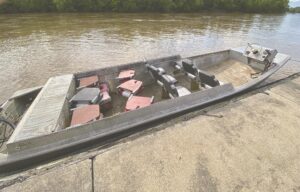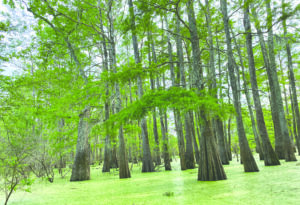
by Tena Starr
I’m a fan of James Lee Burke, who writes gritty crime novels based in New Orleans and the bayou country of Louisiana. Mr. Burke’s books are punctuated by alligator growls in the night, by the life of the bayous and the Atchafalaya, the biggest river swamp, about a million acres, in the U.S.
We were about to see that country.
There are a lot of bayou tours in Louisiana. Most are commercial and lure alligators by dangling marshmallows or hot dogs.
I have zero desire to lure an alligator anywhere near me. So, I booked Dean Wilson’s Last Wilderness Tour, an eco-tour.
Dean Wilson is a basin keeper, meaning he’s one of those people trying to preserve the Atchafalaya and kick the oil companies out of it. He’s knowledgeable, interesting, funny, but his tour is not for the safety obsessed, which I am not.
We met up with Dean at a little store in rural Louisiana, then followed him to the muddy Atchafalaya River where he put in his boat. It was a small motorboat with a plywood floor and sketchy seats and no life jackets offered. There were six of us, four Americans and two guys from the Netherlands. Dean, who had a gray ponytail and a Spanish accent, as in from Spain, warned the men to put their caps on backward or take them off because we’d be going fast.
I wasn’t much concerned about the life jacket thing, given that, if we got dumped in the swamp a cottonmouth snake or an alligator would likely get me long before I drowned.
We roared up the river until Dean slowed and showed us where a female alligator had been hanging out but probably wasn’t anymore because it was mating season. I tried not to picture alligators mating. Eventually, Dean pulled into a cypress grove and stopped the boat, and there he talked about the history and the ecology of this vast swamp.
The water was shallower than the river, roughly seven feet deep, covered in green slime. Cricket frogs chirped. It was high water season, Dean explained. Later, the water would recede, and there would be deer, bear and other animals, but for now the only wildlife were those that could live in water or in trees, like raccoons.
Cypress are rot resistant, so stumps of trees that had been cut decades ago linger. That trait has also made the trees subject to harvest in a part of the country that’s warm and wet and particularly prone to rot and termites. In New Orleans, the pirate Jeanne Lafitte built a house, now a bar, made of cypress after the Spanish took over the city and encouraged brick and cypress buildings to deter the fires that had plagued the city under the French.
We did see alligators, from a distance. Dean described them as shy, particularly during mating season. Shy is not a word I’d thought to apply to alligators, but I was happy to hear it. He pulled into one ghostly area and said, “Welcome to Jurassic Park.” Algae, clogs of water plants, Spanish moss dangling from partially submerged cypress. Beautiful and eerie.
A woman wondered how he navigated such a vast maze of river and swamp. “I don’t always know where I am, but I know how to get back,” Dean said.
Good to know.
On the return trip, a few raindrops fell. Dean said, “You want to see how fast this boat can go?” No one answered, which wasn’t a deterrent. He gunned it.
We stayed that night in what Sylvie, Dean’s daughter, called a cabin that Last Wilderness rented out. I was excited about staying in a cabin in the bayou. It turned out to be a four-bedroom house with carpet on a suburban street. Three bathrooms. My house is a shack compared to the “cabin.”
Sylvie had recommended a restaurant that, she said, had good seafood.
We found a busy place with metal folding chairs for seats and long church-type tables with green, plastic tablecloths. A hefty man in a purple shirt was going table to table, talking to folks about their families. The room was decorated to the gills with patriotic stuff, including a fake Christmas tree loaded with red, white and blue ribbons and doodads. Another with fake fruit and vegetables. Don’t know what that was about. The food was good, heavy on fried, but you could also get a bucket of boiled crayfish.
And then we went south.
It shouldn’t have been a surprise. As we headed through the narrow strip of land that leads to southernmost Louisiana, we encountered a landscape that looked almost apocalyptic.
The Mississippi was on one side, the Gulf of Mexico on the other. In between, were refineries – massive and dark, some spewing smoke. One place, under construction, had thousands of employees, school buses trucking them in, the tops of the buses painted white for some reason. We later learned that place was an expanding LP gas facility.
Black train cars waited to haul fuel elsewhere. There were dozens of RVs parked on ranch house lawns, in parking lots, anywhere and everywhere. We were told that they were occupied by workers who couldn’t find any other lodging — there being about three lodging establishments down there. That anyone with a snippet of land was renting it to workers staying in the RVs.
About halfway down the peninsula, it stopped, and we found ourselves in tiny towns that, hopefully, had seen better days. We took a detour into the town of Buras, which lacked any sign of prosperity, though it’s known for being an oyster hauling town. Land that was supposed to be there, according to our map, wasn’t there anymore. Louisiana is sinking.
I’d booked a room at an old antebellum mansion, now a hunting and fishing lodge, on the Mississippi.
I walked in, and there was no desk or check-in place. A couple of men were sitting in battered leather sofas talking.
Not quite sure what to do, I said to whoever might be interested: my name is Tena, and I booked a room here. After a little chitchat, one of the men hauled himself to his feet and said, well, Miss Tena, your room is up the stairs, there. He whirled his hand around, kind of to the left.
“First room on the right,” he said.
Room number? Nope. Key? Nope.
Our room was beautiful, if you’re good with old. It was painted deep green with wooden floors and a copper sink in the bathroom. I opened the French doors and looked out on the Mississippi from our balcony. Now and then a big ship went by.
I wanted to live there.
There was no soap in the bathroom, but there was a room labeled housekeeping. I figured that since we had no keys to our bedroom, it was likely that housekeeping wasn’t locked either. It wasn’t, and I found soap.
Downstairs, on the deck, men had congregated, drinking the beer offered in a store-sized cooler. Food and drink came with the price of the room. We went down and talked to the fishermen. One was originally from New Hampshire.
“Your state is upside down,” he said when we told him we were from Vermont. They were all going marsh fishing in the morning.
When I’d called to make a reservation at this place a woman had asked: Miss. Tena, will you be charter fishing or hog hunting this trip? She seemed flummoxed when I said neither.
Later, Ray, the owner, explained that we were a rarity. Everyone who stayed at the Saltgrass was either a fisherman or a hunter. Almost no one just booked a room for a night.
I did ask what time dinner was, thinking –wrongly — there might be a fixed time.
Ray looked around and said, what time do you all want dinner? No one seemed inclined toward specifics. Finally, the chef suggested 6:30, so at 6:30 we all sat down together at a big table in one of the big rooms downstairs. The meal was four-course and fantastic, the main course being red fish caught that day.
The ex-military man they called the Chief — the fishing and hunting guide — showed me videos of hog hunting. Apparently, they’re nasty suckers who will try to kill you right to the end. In what I saw, the hunter was using an air boat.
The Chief and the fishermen left at 5:30 so we were alone at our delicious breakfast at 8:30. Then, sadly, I told Steve we’d better get going if we wanted to make our plane back in New Orleans. Captain Ray, the owner, said, well then, Miss Tena, we’ll need to settle up, so I followed him down to his office. He asked what we’d liked best about Louisiana and what we’d found most disappointing.
I didn’t know how to answer that question, because most places are interesting, maybe Louisiana a little more so than some, given its wildly diverging landscapes and culture. That’s not to romanticize a place that has major economic, environmental and social problems.
Steve spoke up and said, “The people.” And that’s true. No matter where we go, people act like fellow Americans, happy to welcome us to their part of a big country. No one, not even in the Deep South, has ever jumped up and said: “You crazy Blue State people elected Bernie Sanders?” For all I know, they’re fans.
What everyone wants to talk about is their work and their kids and their hometown and maybe their adventures, not politics.
Ray struck me as a man I’d like to talk to for a long time, but we had a plane to catch. He said he’d have to charge me 3 percent on the bill if I used a credit card, but I could just send him a check when I got home if I wanted. Really?









